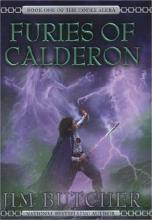Jim Butcher - Furies of Calderon

I have read 15 books by Jim Butcher in the Dresden Files universe, so I decided to give his other series, Codex Alera, a shot.
Background
Unlike the Dresden Files, which are urban fantasy, Codex Alera is a more traditional fantasy series. Magic involves controlling elemental spirits (fire, earth, air, water, metal, and wood), and all humans, except for Tavi, the protagonist, can do some degree of magic. There are several other sentient races in the world, but the Alerans are modeled after Romans. There is also plenty of political intrigue and romance.
The writing style is good, but I was surprised at it. It is very different from the style in the Dresden Files, and if I didn't know that Butcher wrote both of them, I would not have guessed it. Part of that is that Butcher is good at writing from his characters' points of view, and Dresden is a very different character from any of the ones in Alera. Part of it is also that the settings are very different.
Critique
Since The Witcher was the last fantasy series that I read (see my post on The Last Wish and on the other books), I will discuss Furies of Calderon in relation to them.
I liked The Witcher books because, while they focus on a protagonist's heroic journey, they were clearly social commentary about the world in which we live. The world is a close proxy to Earth in the 21st century, despite the magic. The protagonist sees the problems with the world as it is and isn't in a position of power to change them directly, but he feels like he must try to help anyways.
In Furies of Calderon, on the other hand, the problems facing the world aren't very close to the ones that we face in our world. Also, the heroes are too heroic. When the emperor's trusted agent is one of the protagonists, the view of social change is very different than one that would be relevant for most people.
One concrete example of this is how each book deals with war. When Sapkowski is describing war in the Witcher, he mostly doesn't use the series' protagonists. Instead, he tells of it from the medic tent. The doctors are overwhelmed by the bodies coming in from both sides of the conflict, and their heroism is in stiching people back together. The dwarves who voluntarily enlisted, unlike most of the humans who were conscripted, undertake what is essentially a suicide mission to turn the tides of the battle, but they don't get recognition because the king and his people are racist (even more relevant to the US now that we are publicly acknowledging that folks have been passed over for the Medal of Honor due to racism). One of the leaders is heralded for his valor for something that, on the ground, was an act of cowardice. The soldiers wonder at the point of it all. Though the reader won't like the aggressor in the war, they also won't like the defenders in the war who are just a hair less horrible than the aggressors in most ways. People that we care about die.
In Furies of Calderon, the situation is much more heroically sterile. The aggressors are evil, personified by betrayal dehumanized via animals with lots of fangs and pointy teeth. The defenders are fighting for their homelands, everyone behaves in a morally virtuous manner, and there is symbolism of domesticated animals. All of the protagonists play a crucial part. There is a swordfight between the world's two best sword fighters. There are ingenious and extremely powerful displays of magery. Though bodies are strewn about, it feels like Butcher just put them there for the sake of realism and not to actually make the reader care that thousands of people on both sides had just died. There is desperate play after desperate play, but the white knights come out victorious, and everyone is rewarded for their heroism.
I don't think that Earth in the 21st century has wars that are black and white. Even if you look at World War 2, one of the reasons that the Nazis started using gas chambers rather than firing squads is because the soldiers who were shooting innocent people were going insane as a result of it and killing themselves. It took a whole lot of machination on the part of the Nazis to get people to kill others, and Hitler barely won a third of the vote. It isn't as thought the German people just had a bloodlust that caused them to try to conquer the world. It also isn't as though the Allies were free from reproach. And it doesn't seem to me that the war was won by a few heroic people. Rather, I have heard it said that it was American industry, British tenacity, and Russian blood that won the war -- in other words, the sacrifice and bravery of many people.
All of that is to say that, in Furies of Calderon, the characters are good and believable, the action is engaging, and the style is good, but the themes and setting leave something to be desired. I did enjoy it, though, and I plan on finishing the series.



